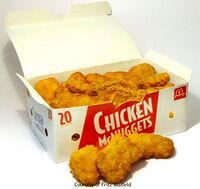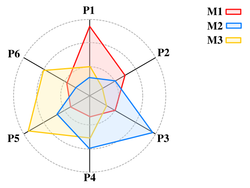Free lunch
“"Nullum gratuitum prandium est" non veritas est.”
Contrary to popular knowledge, there is such a thing as a free lunch. For years, theoretical prandiologists have been combining work in physics, economics, and hamburgerology, and have determined several possible domains in which there may exist a gratis mid-day meal.
Mega Marginal McNugget Theorem
By observing the cost of small edibles sold in gradiated quantities, an observer can see that, as the number of units per package increases, the price per unit decreases. Chicken McNuggets provided a now-famous experimental example:
- 6 McNuggets cost $0.99, or $0.165 per McNugget.
- 9 McNuggets cost $1.26, or $0.14 per McNugget.
- 20 McNuggets cost $1.80, or $0.09 per McNugget.
By extrapolating the unit cost of the individual McNugget relative to the package cost, we see that the cost for marginal McNuggets approaches zero and eventually becomes negative. Once a suitably large number of McNuggets are packaged, the negative-cost McNuggets offset the positive-cost McNuggets, resulting in zero net cost -- a free lunch.
It is important to note that these circumstances have only been created under laboratory conditions, using sophisticated computer simulations and 1,000 liter drums of super-cooled honey mustard sauce. Under these conditions, the number of units per package required to initiate a free-lunch event, the Mega Marginal McNugget number (MMM), is 2,000,000. Because of this, the theorem is also occasionally referred to as the "Over 2,000,000 Served" Property.
Dire Straits/Will "Work" For Food Gambit
As argued in their seminal work on the subject of non-productive labor (Knopfler, Sting: 1988), the team at Dire Straits National Laboratory determined that when an individual is "playing guitar on the MTV", measurements have shown that "that ain't workin'." Similar non-work work activities include "banging on them bongos like a chimpanzee", making "Hawaiian noises", and any other such so-called labor that results in no more severe workplace-related injury than a "blister on your little finger".
While strictly a comparative study of people who "play them drums" versus those who are required to make "custom kitchen deliveries," the Straits team's work suggests an intriguing possibility. If one were to dispense with any and all cash transactions for labor and not perform nothing for money, but, instead, one were to choose to "work" for food, one could get "chicks for free" -- in this context, Chicken McNuggets at no cost to the "laborer". QED, another free lunch.
Theft recursion
It is widely acknowledged that crime does pay. This is the result of profit margins existing in all crime -- a given criminal will only perform a crime if and only if the costs of perpetrating the act do not exceed the rewards.
Re-establishing this principle in the current problem domain, there exists a possibility that the theft of a lunch might ultimately require no costs at all. For example, criminal 1 robs a restaurant of a 6-piece set of Chicken McNuggets. The costs for the crime include a thrift-store ski mask and a cheap weapon, such as a butter gun or left handed screwdriver. Then criminal 2, requiring fewer resources to rob criminal 1 than the restaurant itself, gains possession of the 6 piece. As the number of criminals approaches infinity, the cost of the lunch theft equals zero. This is represented by a formula known to mathemagicians as the Robble Series.
Note that this scenario requires a truly massive number of criminals working together in unison (see Government).
Conclusions
It is indeed possible, under tightly controlled circumstances, to arrive at the free lunch horizon. While real-world experiments have yet to bear fruit, it is hoped that, when they do, the fruit will be delicious and entirely without cost.
| Featured version: 26 May 2009 | |
| This article has been featured on the main page. — You can vote for or nominate your favourite articles at Uncyclopedia:VFH. | |



